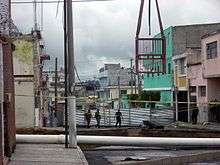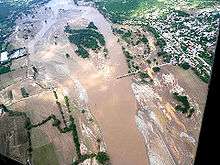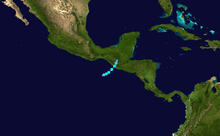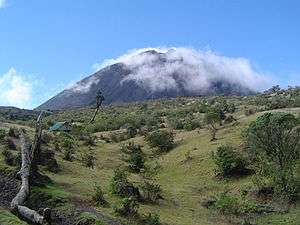2010 Guatemala City sinkhole
The 2010 Guatemala City sinkhole was a disaster in which an area approximately 65 ft (20 m) across and 300 ft (90 m) deep collapsed in Guatemala City's Zona 2, swallowing a three-story factory.[1][2][3][4] The sinkhole occurred for a combination of reasons, including Tropical Storm Agatha, the Pacaya Volcano eruption, and leakage from sewer pipes.[5]
| Date | May 30, 2010 |
|---|---|
| Location | Guatemala City, Guatemala |
| Coordinates | |
| Casualties | |
| 15 dead. | |

Background
Overall, the risk of sinkholes occurring in Guatemala City is high and unpredictable.[6] One recent, similar sinkhole had collapsed in 2007, forming a pit 100 metres deep.[7][8] The 2007 Guatemala City sinkhole was formed by fluid from a sewer eroding uncemented volcanic ash, limestone, and other pyroclastic deposits underlying Guatemala City.[7][8] The hazards around the pipe have since then been mitigated, by improved handling of the city's wastewater and runoff.[9] Several rainstorms also contributed to the sinkhole's collapse, as stormwater percolated into the ground, further dissolving the rocks beneath Guatemala City.[10][11] The 2010 sinkhole was formed for similar reasons.[12]
Formation
Sewage pipes

The sinkhole formed due to volcanic pumice deposits, upon which Guatemala City is built.[3] These deposits were unconsolidated and of low density, allowing easy erosion.[3] According to Sam Bonis, a geologist at Dartmouth College, leaking pipes went unfixed long enough to create the conditions necessary for sinkhole formation because of lax city zoning regulations and building codes.[3] Bonis also says that the Guatemala City sinkhole is a misnomer: sinkholes have natural causes, but this one was mainly artificial.[3] In addition, according to Bonis, sinkholes are usually formed from limestone but there is no limestone hundreds of metres underneath Guatemala City.[3] Bonis proposes that the sinkhole be renamed a piping feature.[3]
Tropical Storm Agatha

Tropical Storm Agatha was first identified as a trough of low pressure of the western coast of Costa Rica on May 24, 2010.[13] On May 29, the depression intensified into a tropical storm and was given the name Agatha.[14] Later that day, the system intensified slightly before making landfall near the Mexico-Guatemala border with winds of 45 mph (75 km/h).[15] By the morning of May 30, the center of Agatha moved over the highest terrain in Central America, resulting in the dissipation of the low-level circulation.[16] Torrential rains from the storm widened the cavity, eventually causing the collapse of the sinkhole.[3]
Pacaya volcano eruption

On May 27, three days before Agatha became a tropical depression, the Pacaya volcano, located about 25 mi (40 km) south of Guatemala City, erupted, killing at least one person and blanketing nearby areas with layers of ash.[17] The eruption prompted officials to shut down the country's international airport.[18] Upon the formation of Agatha, people feared that excessive rainfall from the storm could exacerbate the situation and trigger lahars.[19] This had the effect of clogging the underground pipes with soot, increasing the chances of pipe rupture.[3][4]
Collapse and aftermath
Mariela Castañón, a reporter for the daily newspaper La Hora, reported that the ground collapsed suddenly, taking a three-story house that was used as a factory, and possibly a security guard, along with it. Electricity poles were also sucked in. Authorities said they could not confirm the security guard's death.[1][20]
Because of the role played by sewage pipes in the sinkhole's collapse, Sam Bonis, along with other geologists, has demanded that the government inspect the sewer system more regularly.[4]
According to officials, the sinkhole had similarities with another Guatemalan sinkhole which collapsed in 2007, which may also have been formed by ruptured sewage pipes.[4][21][22]
On a wider scale, immediately following reports of fatalities due to Agatha, a state of emergency was declared for Guatemala.[23] On May 31, the government started to deploy national aid, and donation centers for victims of the storm were opened across the country. According to the Office for the Coordination of Humanitarian Affairs (OCHA), schools in Guatemala were to be closed until at least June 4.[24]
Filling in the sinkhole
Immediately after the sinkhole's collapse, there were plans to fill it in with a soil cement made from cement, limestone, and water known locally as lodocreto ("mudcrete"). This substance was also used to fill in the 2007 Guatemala City sinkhole. However, another technique, which geologists call the graded-filter technique, in which the sinkhole is filled with successive layers of boulders, smaller rocks, and gravel, could possibly be a better solution.[25] This is because filling the hole in with cement diverts water runoff to other areas, potentially increasing the risk of sinkholes occurring in other parts of the city. The graded-filter technique, on the other hand, allows water to seep through.[26]
Update: Checking Google satellite imagery history via Google Earth, the refilling of the hole, and paving could be seen in progress in August 2011 with traffic seen by March 2012. (Latitude: 14°39'7.65"N, Longitude: 90°30'21.23"W)
References
- Fieser, Ezra (June 1, 2010). "Guatemala City sinkhole so big, so round it 'doesn't seem real'". Christian Science Monitor. Santo Domingo, Dominican Republic. Christian Science Monitor. Retrieved 2013-04-21.
- Campbell, Andy (March 5, 2013). "Killer Sinkholes: Unexpected Holes Swallow Entire Families, Cars And Homes (PHOTOS)". Huffington Post. Huffington Post. Retrieved 2013-04-21.
- Than, Ker (June 3, 2010). "Guatemala Sinkhole Created by Humans, Not Nature". National Geographic. National Geographic. Retrieved 2013-04-21.
- Than, Ker (June 1, 2010). "Sinkhole in Guatemala: Giant Could Get Even Bigger". National Geographic. National Geographic. Archived from the original on October 27, 2013. Retrieved 2013-04-21.
- North, Leslie A.; Polk, Jason S.; Nedvidek, Daniel (2014-06-01). "Getting Revved Up About Sinkholes!". Focus on Geography. 57 (2): 97–100. doi:10.1111/foge.12031. ISSN 1949-8535.
- Minard, Anne (June 4, 2010). "Guatemala Sinkhole, 2010". Retrieved 3 July 2013.
- Waltham, T., 2008, Sinkhole hazard case histories in karst terrains. Quarterly Journal of Engineering Geology and Hydrogeology. vol. 41 no. 3, pp.. 291-300.
- Halliday, W. R., 2007, Pseudokarst in the 21st century. Journal of Cave and Karst Studies. vol. 69, no. 1, p. 103–113.
- Reilly, Michael (Jun 4, 2010). "Don't Call The Guatemala Sinkhole a Sinkhole". Retrieved 2013-05-06.
- Chamberlain, Ted (February 26, 2007). "Photo in the News: Giant Sinkhole Swallows Guatemala Homes". National Geographic. Retrieved 2013-05-05.
- "Third body pulled from giant sinkhole". NBC News. NBC. 2007-02-24. Retrieved 2013-05-05.
- Than, Ker (June 1, 2010). "Sinkhole in Guatemala: Giant Could Get Even Bigger". National Geographic. Retrieved 3 July 2013.
- Dave Sandoval (May 24, 2010). "Tropical Weather Discussion". National Hurricane Center. Retrieved May 31, 2010.
- Stacey Stewart and Todd Kimberlain (May 29, 2010). "Tropical Storm Agatha Public Advisory Two". National Hurricane Center. Retrieved May 31, 2010.
- Lixion A. Avila and John Cangialosi (May 29, 2010). "Tropical Storm Agatha Tropical Cyclone Update". National Hurricane Center. Retrieved May 31, 2010.
- Daniel Brown (May 30, 2010). "Tropical Depression Agatha Discussion Five (Final)". National Hurricane Center. Retrieved May 31, 2010.
- Llorica, Juan (May 28, 2010). "Guatemala Volcano: Pacaya Eruption Kills TV Reporter, 3 Missing (PHOTOS)". Huffington Post. Retrieved 3 July 2013.
- "Guatemala warns of volcano danger". CNN. July 22, 2010. Retrieved 3 July 2013.
- Robert Campbell (May 29, 2010). "Guatemala girds for first Pacific storm of season". Reuters. Archived from the original on May 29, 2010. Retrieved May 29, 2010.
- Castañón, Mariela (17 July 2010). "Hundimientos atraen a la prensa extranjera". La Hora. Archived from the original on 11 December 2013. Retrieved 2013-04-21.
- Guo, Shuai; Shao, Yu; Zhang, Tuqiao; Zhu, David. Z.; Zhang, Yiping (2013-01-01). "Physical Modeling on Sand Erosion around Defective Sewer Pipes under the Influence of Groundwater". Journal of Hydraulic Engineering. 139 (12): 1247–1257. doi:10.1061/(ASCE)HY.1943-7900.0000785. ISSN 0733-9429.
- Hermosilla, R. (2012-04-01). "New Information on the Guatemala City Sinkholes from Post Collapse Investigations". Egu General Assembly Conference Abstracts. 14: 1193. Bibcode:2012EGUGA..14.1193H.
- Herbert Hernandez (May 29, 2010). "Pacific storm Agatha's rains kill four in Guatemala". Reuters. MSNBC. Archived from the original on May 29, 2010. Retrieved May 31, 2010.
- Office for the Coordination of Humanitarian Affairs (May 31, 2010). "América Central - Tormenta Tropical Agatha Informe de Situación #1" (PDF) (in Spanish). Red de Información Humanitaria. Archived from the original (PDF) on March 8, 2012. Retrieved June 16, 2010.
- Hermosilla, Rodolfo G. (2011-11-15). "The Guatemala City sinkhole collapses". Carbonates and Evaporites. 27 (2): 103–107. doi:10.1007/s13146-011-0074-1. ISSN 0891-2556.
- Palmer, Brian (June 4, 2010). "How To Fix a Giant Sinkhole". Slate Magazine. Retrieved 16 September 2013.
